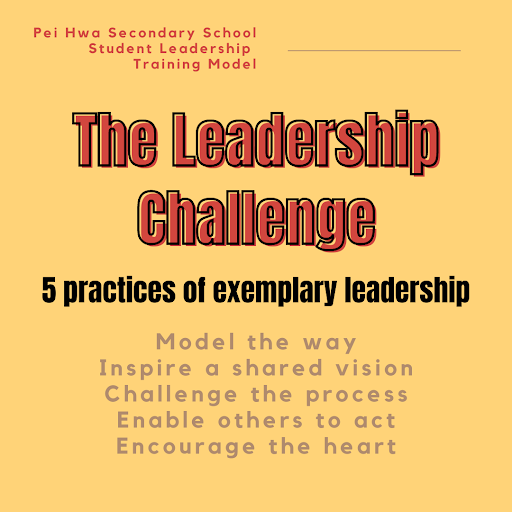Student Leadership
In Pei Hwa Secondary School, we believe that all students can be and should be developed as Forward-Looking Leaders. We hope to develop our student leaders to be confident communicators, effective collaborators, active and empathetic contributors as well as innovative changemakers. We are committed to equipping our students with knowledge and skills to be effective leaders in various areas of their lives.

Our student leadership development programme follows the STEER framework. We consider the various aspects of Selecting, Training, Empowering, Evaluating and Recognizing our student leaders.
Student Leadership Training and Empowerment Opportunities

We believe that leadership is an acquirable set of skills and abilities that can be fostered and cultivated within our students. We adopt The Leadership Challenge as our training model for student leadership development. The 5 practices of exemplary leadership from The Leadership Challenge help to guide and develop student leaders with the skills that they need to be Forward-Looking leaders.
The student leadership development in Pei Hwa Secondary School is part of the school’s Learning for Life Programme (LLP) in Community Youth Leadership. The development of student leaders takes on a tiered-approach with the training programmes and empowerment opportunities specially catered to the different tiers and levels.
Tier 1 student leaders refer to all students. At Tier 1, students do not need to hold a leadership position or title. Level-wide training programmes are conducted for Tier 1 student leaders to equip them with leadership knowledge and skills which they can apply in their daily lives, in and out of school as well as curricular and non-curricular contexts. The focus of the training is progressive and incremental over the students’ 4 to 5 years in Pei Hwa Secondary School.
Tier 2 student leaders include Class Leaders, Peer Support Leaders and CCA Executive Committee members while Tier 3 student leaders include Student Councillors ,CCA Chairpersons and Vice Chairpersons. For Tier 2 and 3 Student Leaders, there are general leadership development programmes, role-specific training programmes and mentorship to equip them for their leadership roles.
| Tier 1: All Students |
Tier 2: Class Leaders and CCA EXCO |
Tier 3: Student Council and CCA Presidents/ Captains |
|
| Sec 1 | Training focus: Leading self Empowerment opportunities: Personal responsibilities at home, in class and at CCA |
Training focus: Role-specific, project planning and facilitation skills Empowerment opportunities: Leading class in class projects and school events as class leaders |
Training focus: Project planning skills Empowerment opportunities: Leading school in some school projects as Student Councillor on probation |
| Sec 2 | Training focus: Working with others Empowerment opportunities: Groupwork in class and CCA |
Training focus: Role-specific, project planning and facilitation skills Empowerment opportunities: Leading class / CCA in class / CCA projects and school events as class leaders or CCA lower secondary EXCO |
Training focus: Project planning, communications, problem-solving skills Empowerment opportunities: Leading school in school projects as Junior Student Councillor |
| Sec 3 | Training focus: Leading others Empowerment opportunities: Leading small groups in class and in CCA |
Training focus: Role-specific, project planning and facilitation skills Empowerment opportunities: Leading class / CCA in class / CCA projects and school events as class leaders or CCA EXCO, planning and leading juniors in school events as student facilitators |
Training focus: Project planning, facilitation, communications and problem-solving skills Empowerment opportunities: Leading CCA / school in CCA / school projects and initiating projects for CCA / school, as CCA president / captain or Student Councillor, leading juniors in school events planning committee or student facilitators |
| Sec 4 & 5 | Training focus: Leaving a legacy Empowerment opportunities: Guiding and mentoring juniors in school and CCA |
Training focus: Role-specific, project planning and facilitation skills Empowerment opportunities: Leading class / CCA in class / CCA projects and school events as class leaders or CCA EXCO, planning and leading juniors in school events as student facilitators |
Training focus: Project planning, facilitation, communications, problem-solving skills Empowerment opportunities: Leading CCA / school in CCA / school projects and initiating projects for CCA / school, as CCA president / captain or Senior Student Councillor, leading juniors in school events planning committee or student facilitators |
We have a variety of programmes aimed at developing our students as Forward-Looking Leaders. Some programmes are targeted to equip students to fulfil specific roles while some seek to equip them with leadership skills which are commonly required across the different leadership roles.
Role-specific training platforms include class committee trainings, peer support training, CCA leaders’ training and Student Council meetings. Student leaders are equipped with role-specific knowledge and skills to lead their peers and carry out their responsibilities.
Some general leadership development programmes include the Sec 2 Basic Leadership Camp, the Sec 3 Advanced Leadership Camp and other external leadership events or programmes. Through these programmes, student leaders are trained to apply The Leadership Challenge model as a leader. They are also equipped with knowledge and skills in problem-solving, facilitation, communication and project management.
Student leaders are also mentored by teachers in charge of the class, various programmes and the leadership groups. Teachers help the student leaders to extend their learning by guiding them in applying what they have learnt, providing constructive feedback and supporting them in reflective practices.
Through the leadership opportunities available in school, we hope to develop student leaders who have a heart to lead and serve others. All student leaders are encouraged to empathise with others and to believe that they can be a positive changemaker in the context of their family, class, CCA, school, the community and even the world.

